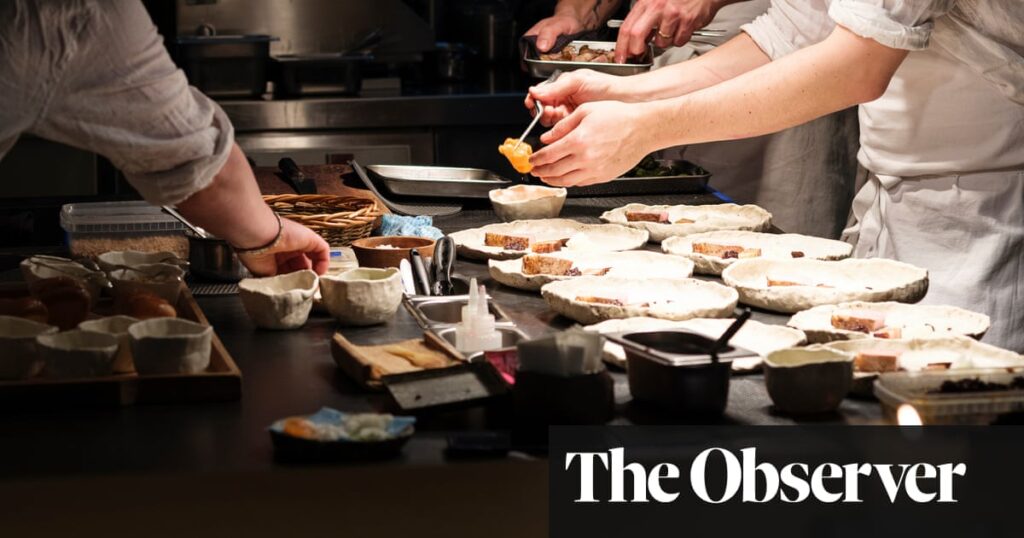‘Five courses in 55 minutes’: rise of the speedy Michelin-star menu | Restaurants

A meal at a Michelin-starred restaurant is a chance to savour some of the finest cooking in the country, often over many hours, with several courses and wine pairings.
But high-end restaurants are now turning to speedy set menus to entice customers through the door for weekday lunches, promising diners they can be in and out within an hour.
Pavyllon at the Four Seasons on London’s Park Lane, which has one Michelin star, offers a £55.50, “five courses in 55 minutes” menu during the week, featuring braised beef cheeks with bone marrow crust and a steamed comté soufflé.
Restaurant St Barts near Smithfield meat market, which has a green sustainability star as well as a regular star, launched its “business lunch hour” menu last month, promising three courses for £55 and a swift return to the office. Murano, Angela Hartnett’s one-star British-Italian restaurant in Mayfair, offers two or three courses for lunch, which they can serve in under an hour.
The death of the long business lunch has long been prophesied, even before Covid made working from home widespread. But even with the return of office workers, restaurants have not seen their lunch customers returning in the same way.
“We realised over the last year that a lot of our lunch traders from the City were asking for a tasting menu in under an hour,” said St Barts co-founder Toby Neill. “It’s pretty tough to do six courses in an hour, so the three-course menu works really well.”
Since introducing the option, around a quarter of guests have opted for the quick lunch which, although cheaper, gives the restaurant an opportunity to turn over more tables. It helps the diners, too, said Neill: “They don’t want to spend four hours, or even two, with a client they don’t really know that well.”
The hospitality industry is under more pressure than ever to bring in customers as the cost of living crisis continues and energy and food prices remain high. According to UKHospitality data, about 40% of Britain’s restaurants are struggling to break even.
after newsletter promotion
Despite the often-wealthy clientele, Michelin-starred restaurants are not immune to these challenges. A cheaper tasting menu can bring in a new customer who may not otherwise book a table. Just three months after opening in October, Brooklands on Hyde Park Corner was awarded two Michelin stars, putting it alongside only 18 other restaurants in the capital with the double honour. The £195 tasting menu takes around three hours, but those in a rush can choose the three-course “Concorde” menu at £58.
For chef director Claude Bosi, the goal was to offer a more affordable experience, aided by using cheaper products such as mussels or cheeks, without skimping on the Michelin flourish. Bosi said around half of lunch guests now opt for the speedy option. “It’s very important to give an opportunity to people who’ve never been to a Michelin-star restaurant to have a first contact,” he said.
It fits in to the way people work, he added: “People want to get back to the office and get home earlier. So we need this lunch menu, it’s very important. People don’t have the time to be in a restaurant.”
Opheem, a two-star restaurant in Birmingham, was ahead of the curve, offering quick options since opening in 2018. Based near the main business district, it allows for a brisk – and more affordable – lunch, at £65 for two courses, as opposed to £115 for the tasting menu.
The cooking is the same, said chef-owner Aktar Islam, but portions are bigger and there are more carbohydrates. There are dishes such as roast aged beef sirloin with bhuna and charred greens, or soft shell crab with caraway tempura. “The lunch menu makes it more accessible and appropriate for various occasions, as opposed to just celebrations and indulgence,” said Islam. “You can still come and have a really good meal, and that be in your lunch break.”
Stefan Chomka, editor of Restaurant magazine, said: “In this climate, restaurants are doing everything they possibly can to get customers. Express lunches are one option.
“For a lot of these high-end restaurants, the perception is that lunch is two, three, four hours. It puts people off … they don’t have time these days. To compete with the more casual offers, they’re saying: come, have a really good meal, and we’ll get you in and out in an hour. And it’s often very good value.”
Source: theguardian.com

